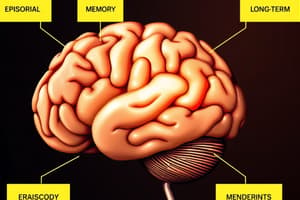Podcast
Questions and Answers
What is the predominant type of coding in long-term memory?
What is the predominant type of coding in long-term memory?
- Kinesthetic coding
- Semantic coding (correct)
- Auditory coding
- Visual coding
Which type of memory is involved in recalling personal experiences?
Which type of memory is involved in recalling personal experiences?
- Implicit memory
- Procedural memory
- Episodic memory (correct)
- Semantic memory
In the context of memory retrieval, what are retrieval cues used for?
In the context of memory retrieval, what are retrieval cues used for?
- To measure the duration of memory retention
- To enhance the encoding of new information
- To trigger the recall of stored information (correct)
- To prevent interference from new memories
How does state-dependent learning enhance memory recall?
How does state-dependent learning enhance memory recall?
Which phenomenon describes the tendency for individuals to be influenced by misleading information after an event?
Which phenomenon describes the tendency for individuals to be influenced by misleading information after an event?
Which type of implicit memory involves skill learning without conscious awareness of the learning process?
Which type of implicit memory involves skill learning without conscious awareness of the learning process?
What is autobiographical memory primarily concerned with?
What is autobiographical memory primarily concerned with?
Which of the following best defines the role of priming in memory?
Which of the following best defines the role of priming in memory?
Which of the following conditions is associated with the inability to form new memories?
Which of the following conditions is associated with the inability to form new memories?
What is the result of a person experiencing retrograde amnesia?
What is the result of a person experiencing retrograde amnesia?
Which of the following best illustrates the difference between episodic and semantic memory?
Which of the following best illustrates the difference between episodic and semantic memory?
What effect does negative priming have on memory performance?
What effect does negative priming have on memory performance?
What aspect of memory can be affected by using retrieval cues?
What aspect of memory can be affected by using retrieval cues?
Which statement about the separation of episodic and semantic memories is accurate?
Which statement about the separation of episodic and semantic memories is accurate?
What best describes encoding specificity?
What best describes encoding specificity?
Which of the following scenarios illustrates state-dependent learning?
Which of the following scenarios illustrates state-dependent learning?
What does the misinformation effect primarily demonstrate?
What does the misinformation effect primarily demonstrate?
Which aspect distinguishes recent autobiographical memories from distant ones?
Which aspect distinguishes recent autobiographical memories from distant ones?
Which statement about retrieval cues is accurate?
Which statement about retrieval cues is accurate?
How can the phenomenon of retroactive interference be best described?
How can the phenomenon of retroactive interference be best described?
Which of the following best explains the concept of autobiographical memory?
Which of the following best explains the concept of autobiographical memory?
Which method is most effective for improving memory retention according to the levels-of-processing theory?
Which method is most effective for improving memory retention according to the levels-of-processing theory?
What results from the memory trace replacement hypothesis in relation to misleading post-event information?
What results from the memory trace replacement hypothesis in relation to misleading post-event information?
Which of the following statements about the DRM false memory effect is correct?
Which of the following statements about the DRM false memory effect is correct?
What is a key aspect of the self-reference effect in memory recall?
What is a key aspect of the self-reference effect in memory recall?
In the context of enhancing memory through organizations, which is true?
In the context of enhancing memory through organizations, which is true?
What role do retrieval cues play in memory recall?
What role do retrieval cues play in memory recall?
What can most accurately be said of the relationship between encoding and retrieval?
What can most accurately be said of the relationship between encoding and retrieval?
What primarily influences the organization of information in long-term memory?
What primarily influences the organization of information in long-term memory?
Korsakoff’s syndrome is caused by an excess of vitamin B1.
Korsakoff’s syndrome is caused by an excess of vitamin B1.
What is the term for the inability to form new memories?
What is the term for the inability to form new memories?
Memory for stimuli presented at the beginning of a sequence is known as the ______ effect.
Memory for stimuli presented at the beginning of a sequence is known as the ______ effect.
Match the types of long-term memory with their descriptions:
Match the types of long-term memory with their descriptions:
Which type of coding is primarily involved in long-term memory?
Which type of coding is primarily involved in long-term memory?
Patients with functioning short-term memory can still form new long-term memories.
Patients with functioning short-term memory can still form new long-term memories.
What describes the effect where individuals rate previously encountered statements as true?
What describes the effect where individuals rate previously encountered statements as true?
Procedural memory is also known as ______ memory.
Procedural memory is also known as ______ memory.
Match the type of amnesia with its definition:
Match the type of amnesia with its definition:
Which brain structure is associated with the loss of episodic memory in K.C.?
Which brain structure is associated with the loss of episodic memory in K.C.?
Semantic memory can exist without episodic memory.
Semantic memory can exist without episodic memory.
What is the method that demonstrates the effect of familiarity in memory recall?
What is the method that demonstrates the effect of familiarity in memory recall?
Increased accuracy of response to a test stimulus due to prior exposure is known as ______ priming.
Increased accuracy of response to a test stimulus due to prior exposure is known as ______ priming.
What defines elaborative rehearsal?
What defines elaborative rehearsal?
Deep processing leads to poorer memory retention than shallow processing.
Deep processing leads to poorer memory retention than shallow processing.
What is the term for memory that is associated with a person's internal state at the time of encoding?
What is the term for memory that is associated with a person's internal state at the time of encoding?
The phenomenon where misleading information affects a person's memory is known as the ______ effect.
The phenomenon where misleading information affects a person's memory is known as the ______ effect.
Match the type of rehearsal with its description:
Match the type of rehearsal with its description:
What is an effective strategy to enhance memory retention during encoding?
What is an effective strategy to enhance memory retention during encoding?
Propositions can have a truth value assigned to them.
Propositions can have a truth value assigned to them.
What technique did Shereshevsky use to aid his perfect memory?
What technique did Shereshevsky use to aid his perfect memory?
The process of transferring information from long-term memory to working memory is known as ______.
The process of transferring information from long-term memory to working memory is known as ______.
Match the study to its key finding:
Match the study to its key finding:
How does matching the conditions of encoding and retrieval influence memory?
How does matching the conditions of encoding and retrieval influence memory?
The self-reference effect improves memory when relating words to oneself.
The self-reference effect improves memory when relating words to oneself.
What effect does generating information have on learning and retention?
What effect does generating information have on learning and retention?
In free recall, participants must retrieve information without any ______.
In free recall, participants must retrieve information without any ______.
Match the type of memory with its description:
Match the type of memory with its description:
What is a key benefit of placing a word in a complex sentence?
What is a key benefit of placing a word in a complex sentence?
State-dependent learning means that memory retrieval is better when the internal state during encoding and retrieval are different.
State-dependent learning means that memory retrieval is better when the internal state during encoding and retrieval are different.
Define recognition memory.
Define recognition memory.
Match the following concepts with their definitions:
Match the following concepts with their definitions:
Which of the following best describes paired-associate learning?
Which of the following best describes paired-associate learning?
Mental models include the inferences drawn by the hearer or reader.
Mental models include the inferences drawn by the hearer or reader.
What is meant by 'misleading post-event information' (MPI)?
What is meant by 'misleading post-event information' (MPI)?
Information is best recalled when the encoding and retrieval occur in the same ______.
Information is best recalled when the encoding and retrieval occur in the same ______.
Which of the following is true regarding mental images?
Which of the following is true regarding mental images?
Flashcards
Encoding (LTM)
Encoding (LTM)
The process of acquiring information and storing it in long-term memory.
Retrieval (LTM)
Retrieval (LTM)
The process of bringing information from long-term memory to working memory.
Maintenance Rehearsal
Maintenance Rehearsal
Repeating information, without meaningful connections, to keep it in short term memory.
Elaborative Rehearsal
Elaborative Rehearsal
Signup and view all the flashcards
Levels-of-processing Theory
Levels-of-processing Theory
Signup and view all the flashcards
Proposition
Proposition
Signup and view all the flashcards
Mental Models
Mental Models
Signup and view all the flashcards
Encoding Specificity
Encoding Specificity
Signup and view all the flashcards
State-Dependent Learning
State-Dependent Learning
Signup and view all the flashcards
Transfer-appropriate Processing
Transfer-appropriate Processing
Signup and view all the flashcards
Misinformation Effect
Misinformation Effect
Signup and view all the flashcards
Testing Effect
Testing Effect
Signup and view all the flashcards
Retrieval Cues
Retrieval Cues
Signup and view all the flashcards
Autobiographical Memory
Autobiographical Memory
Signup and view all the flashcards
Schema
Schema
Signup and view all the flashcards
Long-Term Memory (LTM)
Long-Term Memory (LTM)
Signup and view all the flashcards
Semantic Coding
Semantic Coding
Signup and view all the flashcards
Korsakoff's Syndrome
Korsakoff's Syndrome
Signup and view all the flashcards
Amnesia
Amnesia
Signup and view all the flashcards
Retrograde Amnesia
Retrograde Amnesia
Signup and view all the flashcards
Anterograde Amnesia
Anterograde Amnesia
Signup and view all the flashcards
Primacy Effect
Primacy Effect
Signup and view all the flashcards
Recency Effect
Recency Effect
Signup and view all the flashcards
Explicit Memory
Explicit Memory
Signup and view all the flashcards
Episodic Memory
Episodic Memory
Signup and view all the flashcards
Semantic Memory
Semantic Memory
Signup and view all the flashcards
Implicit Memory
Implicit Memory
Signup and view all the flashcards
Procedural Memory
Procedural Memory
Signup and view all the flashcards
Priming
Priming
Signup and view all the flashcards
What is Korsakoff's syndrome?
What is Korsakoff's syndrome?
Signup and view all the flashcards
What is Amnesia?
What is Amnesia?
Signup and view all the flashcards
What is the Primacy Effect?
What is the Primacy Effect?
Signup and view all the flashcards
What is the Recency Effect?
What is the Recency Effect?
Signup and view all the flashcards
What is Semantic Coding?
What is Semantic Coding?
Signup and view all the flashcards
What is Recognition Memory?
What is Recognition Memory?
Signup and view all the flashcards
Single Dissociation
Single Dissociation
Signup and view all the flashcards
Double Dissociation
Double Dissociation
Signup and view all the flashcards
Mirror Drawing
Mirror Drawing
Signup and view all the flashcards
Shereshevsky's Memory
Shereshevsky's Memory
Signup and view all the flashcards
Spatial Relations (Memory)
Spatial Relations (Memory)
Signup and view all the flashcards
Mental Models (Memory)
Mental Models (Memory)
Signup and view all the flashcards
Levels of Processing (Theory)
Levels of Processing (Theory)
Signup and view all the flashcards
Matching Conditions of Encoding and Retrieval
Matching Conditions of Encoding and Retrieval
Signup and view all the flashcards
Encoding
Encoding
Signup and view all the flashcards
Retrieval
Retrieval
Signup and view all the flashcards
Propositional Representation
Propositional Representation
Signup and view all the flashcards
Mental Images
Mental Images
Signup and view all the flashcards
Study Notes
Long-Term Memory Structure
- All information encoded in LTM is semantic in nature
- Semantic codes combine to form propositions
- Long-term memory has a large capacity in terms of both space and duration
- Well-organized
Korsakoff's Syndrome and Amnesia
- Korsakoff's syndrome damages areas in the frontal and temporal lobes, leading to severe and permanent memory impairments. Usually caused by chronic alcoholism and vitamin B1 deficiency.
- Amnesia involves memory loss and/or the inability to learn.
- Retrograde amnesia involves the loss of memory for events before a trauma, but the ability to form new memories remains.
- Anterograde amnesia involves an inability to form new memories.
Distinguishing Between LTM and STM
- Long-term memory (LTM) is responsible for storing information over long periods.
- This includes a vast archive of information about past events.
Serial Position Curve
- Primacy effect: superior memory for stimuli presented at the beginning.
- Recency effect: superior memory for stimuli presented at the end; words are still in short-term memory (STM).
Coding in Long-Term Memory
- Although visual, auditory, and semantic coding can occur in LTM, semantic coding is prevalent.
- Example of semantic coding: Mistaking "tree" for "bush", highlighting the importance of meaning over visual or auditory cues in LTM.
Recognition Memory
- Recognition memory involves identifying a stimulus encountered previously.
- Pre-training involves presenting a stimulus.
- Testing involves presenting the same stimulus alongside others that were not presented before.
Location of STM and LTM in the Brain
- STM and LTM are distinct brain regions but there's some evidence for overlap.
Types of Long-Term Memory
- Explicit Memory (Declarative): Conscious memories
- Episodic: Personal experiences
- Semantic: Knowledge and facts
- Implicit Memory (Non-declarative): Unconscious memories
- Procedural: How to do things
- Priming: Change in response to stimuli due to previous exposure
- Classical conditioning: Stimulus response associations.
Distinguishing Episodic and Semantic Memory
- Episodic memory involves mental time travel, recalling past events.
- Includes what, when, and where.
- Semantic memory involves accessing knowledge about the world without remembering a personal experience.
Neuropsychological Evidence (Separation)
- K.C. suffered severe damage to the hippocampus, losing episodic memory, though semantic memory remained intact.
Encoding and Retrieval in LTM
- Encoding: process of acquiring information and moving it into LTM.
- Retrieval: is the process of moving information from LTM to working memory.
Priming (Implicit Memory)
- Priming occurs when a stimulus (priming stimulus) influences a response to a later stimulus (test stimulus)
- Negative priming: slows down processing.
- Positive Priming: speeds up/ enhances processing
Levels of Processing Theory
- Memory depends on how information is encoded.
- Deeper processing enhances encoding and retrieval relative to shallow processing.
Research Showing Encoding Influences Retrieval
- Factors like placing words in complex sentences, forming visual images, and connecting words to personal experiences improve memory retrieval.
- Generating information (generation effect) enhances learning and retention compared to passively receiving.
Organizing Information in Memory
- Memory systems organize information for efficient access.
- Effective retrieval relies on organized memory.
Retrieval (Getting Information from Memory)
- Retrieval cues (words or stimuli) help access stored information.
- Cued recall involves retrieval cues to aid memory.
- Free recall is recalling information without cues.
Eyewitness Testimony
- Information in eyewitness memory can be changed by elaborations or misleading information.
Misinformation Effect
- Misleading post-event information given after an event can change how a person describes that event later.
Autobiographical Memory
- Multidimensional, containing spatial, emotional, and sensory components.
- Loss of one aspect results in partial memory loss.
Studying That Suits You
Use AI to generate personalized quizzes and flashcards to suit your learning preferences.




